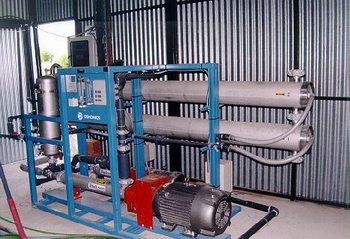 Membrane processes are an alternative to conventional water and waste water treatment methods. The use of membranes for such applications is limited by the relatively high operating cost associated with the membrane cost and power, which however changes gradually due to rising demands for high standards and reduced environmental impact.
Membrane separation techniques involve typically Macro Filtration for suspended solids removal, Ultra Filtration for removal of bacteria and colloids, and Reverse Osmosis for ion rejection.
The TTPL equipment includes a pilot membrane unit for the experimental confirmation of the technology to be used for the treatment of various types of waste water. In the framework of a European funded research project, TTPL in cooperation with DELTA industry has participated in the development and installation of membrane unit for the treatment of the wastewater from the Diary Industry. Furthermore, TTPL has successfully completed research projects for the treatment of tannery waste water, by developing and verifying in pilot scale an integrated technology that aimed to the recovery and reuse of water. The technology included pre-treatment, primary and final treatment, and introduced the use of integrated membrane processes, like microfiltration, ultrafiltration, nanofiltration and reverse osmosis.
Membrane processes are an alternative to conventional water and waste water treatment methods. The use of membranes for such applications is limited by the relatively high operating cost associated with the membrane cost and power, which however changes gradually due to rising demands for high standards and reduced environmental impact.
Membrane separation techniques involve typically Macro Filtration for suspended solids removal, Ultra Filtration for removal of bacteria and colloids, and Reverse Osmosis for ion rejection.
The TTPL equipment includes a pilot membrane unit for the experimental confirmation of the technology to be used for the treatment of various types of waste water. In the framework of a European funded research project, TTPL in cooperation with DELTA industry has participated in the development and installation of membrane unit for the treatment of the wastewater from the Diary Industry. Furthermore, TTPL has successfully completed research projects for the treatment of tannery waste water, by developing and verifying in pilot scale an integrated technology that aimed to the recovery and reuse of water. The technology included pre-treatment, primary and final treatment, and introduced the use of integrated membrane processes, like microfiltration, ultrafiltration, nanofiltration and reverse osmosis.
Selected publications
- Voros N.G., Fountoukidis E., Magoulas K.G., Maroulis Z.B., Papadimitriou L., A combined UF/RO Waste water cleaning system: design, operation and Economic Assessment, Internat. Desal. Water Reuse, 9(3), 1999, 26-31

